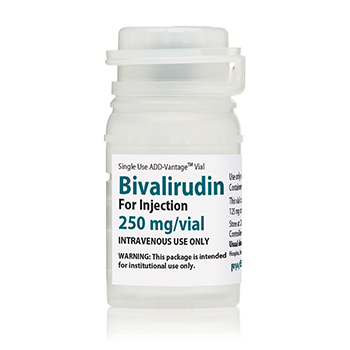
Bivalirudin is a specific and reversible direct thrombin inhibitor. Chemically, it is a synthetic congener of the naturally occurring drug hirudin. More
Bivalirudin is a specific and reversible direct thrombin inhibitor. Chemically, it is a synthetic congener of the naturally occurring drug hirudin.
Bivalirudin- specific and reversible direct thrombin inhibitor.
Bivalirudin; Angiomax; Hirulog; Hirulog-1
Angiomax, Bivaflo, Bivasave, Bivastat
(4S)-4-[(2S)-2-[(2S)-2-[(2S)-2-{2-[(2S)-2-(2-{2-[2-(2-{[(2S)-1-[(2S)-2-{[(2S)-1[(2R)-2-amino-3-phenylpropanoyl]pyrrolidin-2-yl]formamido}-5-carbamimidamidopentanoyl]pyrrolidin-2-yl]formamido}acetamido)acetamido]acetamido}a
Bivalirudin directly and reversibly inhibits thrombin by specifically binding to the anion-binding exosite of circulating and clot-bound thrombin and to the catalytic site. The action of bivalirudin is reversible because thrombin will slowly cleave the thrombin-bivalirudin bond which recovers the active site of thrombin.
750 mcg/kg by IV injection followed by an infusion of 1.75 mg/kg/hr during procedure and up to 4 hr post procedure.
For treatment of heparin-induced thrombocytopenia and for the prevention of thrombosis.
Bleeding, hypersensitivity reactions. Hypertension, hypotension, bradycardia, nausea, dyspepsia, vomiting, urinary retention, headache, back pain, pain at injection site and anxiety. Severe anaphylactic reactions which may lead to death.
May increase risk of bleeding when used with oral anticoagulants, thrombolytic, or drugs that affect platelet function.
Active major bleeding. CrCl <30 ml/min and dialysis-dependent patients
Unopened vials stored at 15-30°C whereas reconstituted vials stored at 2-8°C.
2180.2853
C98H138N24O33
128270-60-0